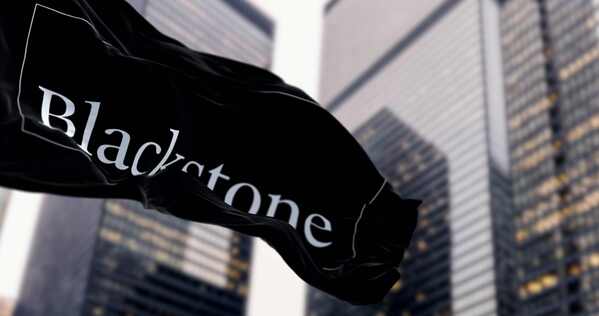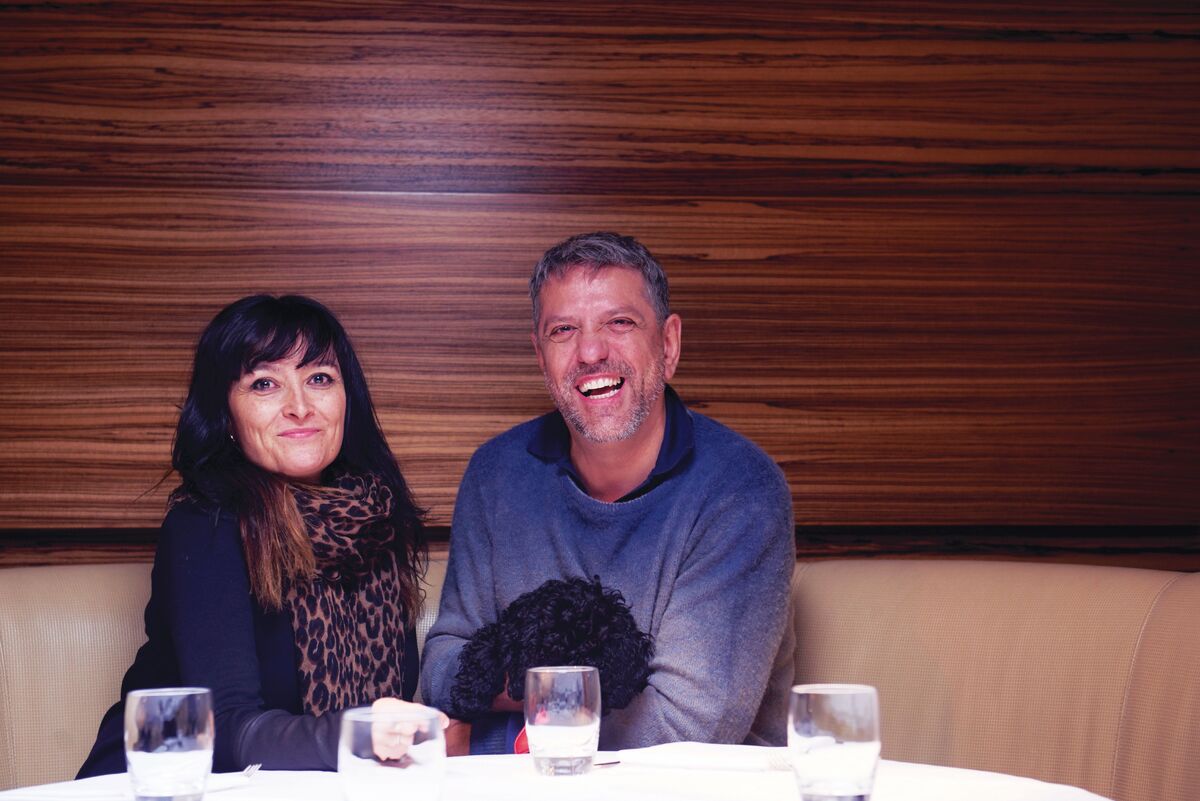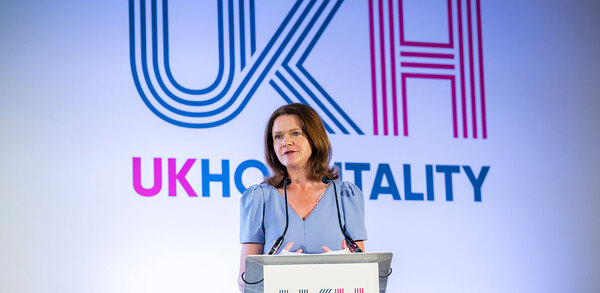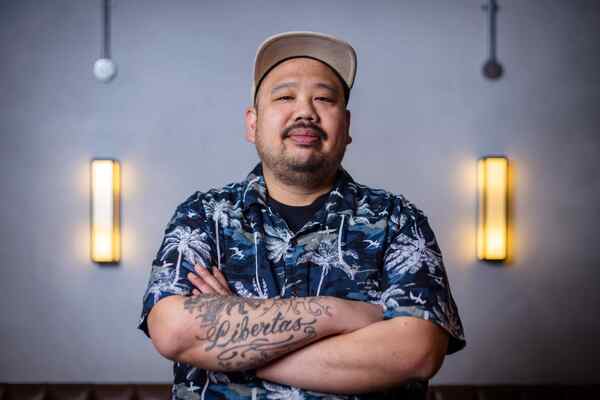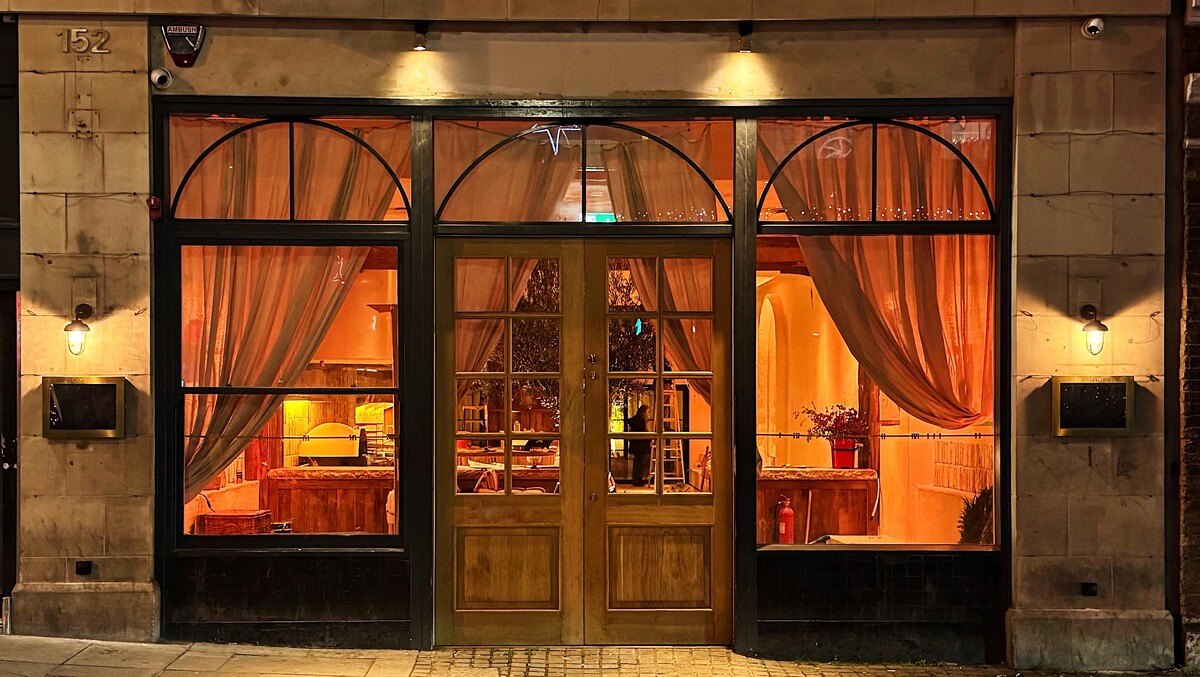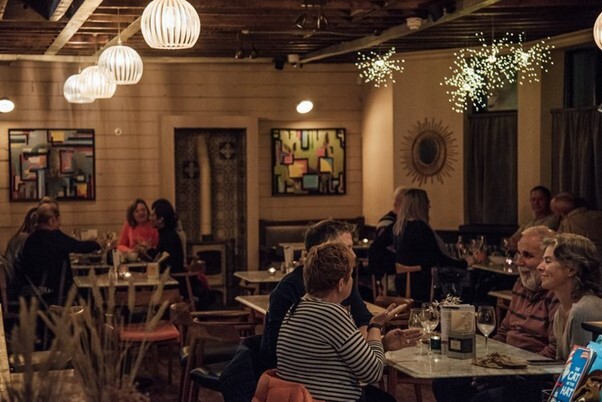Fifteen Foundation celebrates five years
August will see the fifth anniversary of the launch of social enterprise charity the Fifteen Foundation, which aims to change the lives of disadvantaged kids by bringing them into the restaurant industry. As the charity gears up for the next five years, Tom Vaughan meets its latest success story
"It's orange," announces Jamie Oliver's PR manager as we drive into the car park of Aaron Craze's pub, the Cock Inn, in Beazley End, Essex. It is obviously not the first time he has visited the pub and, like millions of Channel 4 viewers, I watched Craze paint the building on the TV show Jamie's Chef, but there's something about the small screen that doesn't quite convey the fact that when the sun hits the pub it flares up the colour of a giant salmon fillet.
Whatever you make of the colour, the pub's decoration was one of the easier challenges faced by Craze when he was selected to take over the business.
Aired in February this year, Jamie's Chef saw Craze fight off competition from 13 other Fifteen graduates, to be given the proprietorship of the Cock by a panel of judges that included Jamie Oliver, Fifteen director Liam Black and restaurateur Nick Jones.
Craze's transition from commis chef at the Fifteen London restaurant to chef-proprietor of his own business was far from seamless, however. Understaffed and woefully underprepared for the first few services at the pub, Craze, who took on the management of the pub with his partner, Nicci, struggled to adapt to the pressures of running a restaurant. And when the series ended, it was far from clear whether he was going to make a success of it.
Entering the pub two months on, the most obvious difference from its depiction on TV is the sense of dynamism in the air. When Jamie's Chef was shown, there was essentially only Craze, Nicci and a sous chef running the pub, often to chaotic effect. Now there are swarms of staff milling about their daily duties.
The other big change is Craze himself. Having come across as a somewhat reluctant recipient of the pub, threatening to walk away if the mortgage wranglings that initially kept him, Nicci and their two daughters in a B&B weren't sorted, he is now refreshingly laid-back and talks about the business with the pride of a new father. And as if to prove any doubters wrong, the pub recently received its first AA rosette.
He is swift to point out that his very existence outside London, running a village pub, is down to the Fifteen Foundation. "I don't know what I'd be doing if I wasn't here," he says, "maybe some rubbish job in London."
Serial job swapper
Craze's background was well documented on the show. Son of an alcoholic, he was a serial job swapper, flitting between professions before joining the Fifteen training scheme in 2003. "The move was entirely motivated by financial reasons," he says. "The cooking didn't come into it I just wanted to get a regular pay cheque for my family."
With the huge support of the Fifteen Foundation, he now finds himself in the enviable position of having his own rural business and a bolthole in the Essex countryside.
With the Fifteen Foundation owning the freehold of the property, Craze was given a £125,000 loan by the charity for set-up and initial running costs and moved into the pub's upstairs flat with Nicci and their two young daughters.
His initial struggle to get to grips with the Cock came as no big surprise to Sharon Wright, project manager of Fifteen Ventures, an arm of the charity established to help Fifteen graduates set up their own businesses. "Personally, I didn't think any of the graduates were ready for it," says Wright. "They are all very promising chefs, but they've only been in the industry for three years."
When Fifteen started, the brief given to graduates was to go out into the industry for five years, learn the profession and then, if they had formed a business plan, the Fifteen Foundation would look at ways of helping them.
So, with the first trainees having graduated only in 2003, Oliver's plan to install one of them at the Cock was "two years earlier than we expected", says Wright.
What the programme didn't show was the preparation that the Fifteen Foundation put the hopefuls through before their final pitch for the Cock. All three finalists took a six-week course in business management, with topics ranging from how to assemble a business plan to the basics of running front of house and finances.
But one thing that couldn't have been anticipated was the effect that Jamie's dad, Trevor Oliver, chef-proprietor at the Cricketers pub in Clavering, Essex, would have on Craze. Seeing he was struggling to come to terms with running a kitchen, Jamie sent Craze to work alongside Trevor, the source of his own work ethic and passion for food, ahead of the Cock's launch date.
It was a baptism of fire, admits Craze. "I worked straight through from 5am to midnight. I didn't want to show any weakness to Trevor, as he was sceptical in the first place. I wanted to prove to him that I was ready for this and not just some wide-boy. I thought to myself that if I can get through this, then I'll be ready to run my own kitchen."
And Craze will be the first to admit that the fortnight he spent at the Cricketers left more of an impression than he expected. "Trevor's always got a job to do," he says. "His work ethic is unbelievable, and that's rubbed off on me. Sending me there was the best thing the charity did. If I now had to choose a role model, it would be him. He's got an amazing life and a job he loves."
So, despite the Cock's chaotic opening in October 2006, Craze's basic understanding of business, his new-found work ethic and the support of Jamie Oliver and the Fifteen Foundation meant it wasn't struggling for long.
The first few months
Knowing full well that running the pub would be difficult at first, Craze put aside a small part of his £125,000 loan to help it through the first few months. With Christmas gone, Craze said he was well aware that, come February, when the TV show aired, the pub would arouse a huge amount of curiosity. He used the quiet January and the remainder of the loan to hire and train 30 staff members - 10 of them full-time - and make sure the business was prepared.
He constantly tinkered with the menu at first, trying find the right balance between pub grub and the Italian food he had originally intended, while making sure all the dishes were popular with customers.
With the food and systems in place, the surge in popularity that Craze predicted duly arrived. But this time the pub was prepared. In March, before the good weather hit, the 88-seat pub was doing more than 70 covers on weekdays and more than 170 at weekends, with an average spend of £29 at dinner.
Although he is reluctant to discuss turnover, Craze hopes that if business continues as it has, he will have the loan paid off by the middle of 2008 when he can start thinking about buying the freehold. "People are coming here out of curiosity at the moment," he says. "Our job now is to keep them coming back."
He is also keen not to let the recent success go to his head. "Businesses are like children," he says. "Mine's only just crawling, but one day I hope it'll be like Trevor's, which can take huge strides almost on its own."
There was a suggestion from Jamie in the TV show that, if Craze failed, it would mean other graduates would not get a similar chance, but Wright is keen to stress that this was by no means certain. "We would have had to look at Aaron's situation and analyse where we went wrong," she says. "But I don't think it would blow others' chances."
Her reaction is in line with recent developments at Fifteen, where Fifteen Ventures was set up at the same time as the Cock project. They are already on course to help other graduates, such as Tom Baisden, a failed applicant for the Cock who is looking to set up a catering business with another graduate, Robbie Kahdim.
With Fifteen celebrating its fifth anniversary in August, these are exciting times for the charity. And no one is more excited about the future than director Liam Black.
"In my opinion, Fifteen is in its third chapter," he says. "The first was the Jamie's Kitchen period, with high energy and enthusiasm pushing it through. The second was when the new leadership, such as myself and Paula Dupuy, joined in 2004. And the third I consider to have started on 1 January this year, when our three-year plan commenced."
Black says it was no big secret that, despite the enthusiasm and popularity of the early years, the business plan was flawed and Fifteen lost a lot of money. Now that the restaurant has been shown to work and franchises in Cornwall, Melbourne and Amsterdam have proved it can be replicated, the task in hand is to diversify the brand to appeal to youngsters throughout the world.
Core elements
Black hopes to establish three core elements to this: first, helping more graduates develop their own business second, an online network between all Fifteen restaurants, where trainees can learn from, and teach, each other, "showing them they can be mentors themselves" and third, to develop a grant system to help youngsters who might be too far away to join the Fifteen training scheme but who can apply for, say, £500 to go on a course instead.
"The challenge," says Black, "is how we hang on to the amazing spirit and creativity that Jamie drove into the business five years ago, and not become some corporate machine."
By 2010, Black envisages one new Fifteen restaurant a year opening until 2010, with a network of chefs swapping between them. The most important aspect, though, is where the restaurants open. "I want to go where the need of young people is the most acute," he says. "It has to be somewhere where the restaurant will be successful, somewhere with an excellent supply chain, and somewhere where there are disillusioned young people."
This mix of factors has already led the charity to turn down some franchise offers, and the next Fifteen restaurant will be in the British Isles and run in-house, says Black. "The board calls us a ‘small giant', and we want to keep that. We can't grow too big too quickly."
The entire ethos of Fifteen is built around the trainee, and the passion this instils in all involved is evident. "What I love doing is making people's dreams become reality," says Wright. "It's great to see youngsters who were previously drug addicts or petty thieves realising the ramifications of being pushed and watching a new-found dedication change their lives."
Even if the bold plans for Fifteen don't work out, and even if other graduates struggle to meet expectations, one graduate has already shown Wright that her hopes are by no means unrealistic.
"I'll always be here at the Cock now - I'll never want to go," says Craze. "I've had the chance to give my family a proper life. It's unbelievable."
Then, as the interview ends, the one-time serial job swapper excuses himself, explaining that he's not used to taking too many breaks in his normal 18-hour day.
The Cock Inn, Beazley End, Braintree, Essex CM7 5JH. Tel: 01371 850566. Website: www.thecock-inn.com
Another initiative… Acorn House
Acorn House's training programme aims to do for environmental causes what Fifteen has done for disadvantaged kids. Since Arthur Potts Dawson, a former head chef at Fifteen, and James Grainger Smith, who helped set up Fifteen in 2002, opened Acorn House in London's King's Cross in November 2006, it has been heaped with praise, including winning this year's Observer Food Monthly Best New Restaurant award.
Its novel and thorough approach to sustainability includes composting or recycling all kitchen waste, sourcing only sustainable and organic produce, and receiving it all in one delivery by hybrid-electric lorry. In the coming months, it hopes to take on 10 trainees for a three-year course involving NVQ levels 2 and 3, with sponsorship from Potts Dawson and Grainger Smith's Bliss Restaurant Consultancy.
"For example, if I think someone's going to make a great sommelier, we'll sponsor them to do a wine course," says Potts Dawson. "There they can find out all about sustainable vineyards and their importance."
The hope, he says, is that just as Fifteen has opened up the industry to people who might otherwise not have considered it, Acorn House, by sending out chefs and restaurateurs versed in an eco-friendly philosophy, will help bring climate change and sustainability issues into the industry's consciousness.
Fifteen
The Fifteen London restaurant was founded in 2002 by Jamie Oliver, as was the charitable foundation Cheeky Chops (now the Fifteen Foundation). The charity was funded by the restaurant for the first few months, but now funds itself through trading and franchise fees, fundraising events, corporate sponsors and social invesment companies. Franchised restaurants in Cornwall, Amsterdam and Melbourne followed, and a catering company, Fifteen To You, was set up in March 2006. Late last year, Fifteen Ventures was established to invest in and mentor graduates and their business ideas.
Rising stars from fifteen kitchens
Ben Arthur
Stints of labouring and working in menial office jobs taught Ben Arthur that "some jobs never lead anywhere exciting". After getting into more and more trouble with "the wrong sort of crowd" outside work, he went to a JobCentre to seek advice. Eight months later they sent him an application form for Fifteen, and the rest, as they say, is history. After a scholarship in Tuscany and stints running the pasta section at Fifteen, he phoned Theo Randall at the InterContinental, London, and asked for a job. Now he not only operates as chef de partie there, but has also accepted an invitation from Liam Black to sit on the board at Fifteen. "I always popped in to see how new trainees were doing," says Arthur. "And I guess having someone with a similar background around helps them to confide in someone."
Tom Baisden
Familiar to anyone who saw Jamie's Chef, Tom Baisden narrowly missed out on getting through to the final four graduates who pitched for the pub. A former drug abuser and small-time dealer, he used cooking to fill the gap when he gave up drugs. After graduating from Fifteen, he admits he was unsure what direction to take with his new skills. After missing out on the Cock, he was reunited with fellow graduate Robbie Kadhim, and the pair were asked to cater for Jamie Oliver while he filmed a recent TV series. It proved to be the start of a great partnership and, with money from Fifteen to help obtain mentoring in running a business, the pair hope the charity will "hold their hands" as they launch Chalk and Cheese Catering in the coming months.
Ralph Johnson
After dropping out of art college, Ralph Johnson admits he strove to find a creative vocation he could master. After successfully applying to Fifteen, he completed stages at St John, Thyme and Pied à Terre in London, and at Heston Blumenthal's Fat Duck in Bray. From there he has worked in the London kitchens of Tom Aikens in Chelsea, Tabernacle in Shoreditch and Nahm in Belgravia and has finally managed to organise the scholarship that Fifteen helps all graduates arrange. For the next 12-18 months he will be moving to New York to work at the Spotted Pig, labelled the city's first gastropub. All of which is a means to achieving his goal of owning a restaurant, maybe a 30-seater in the Portobello Road, he says, within the next three years.





